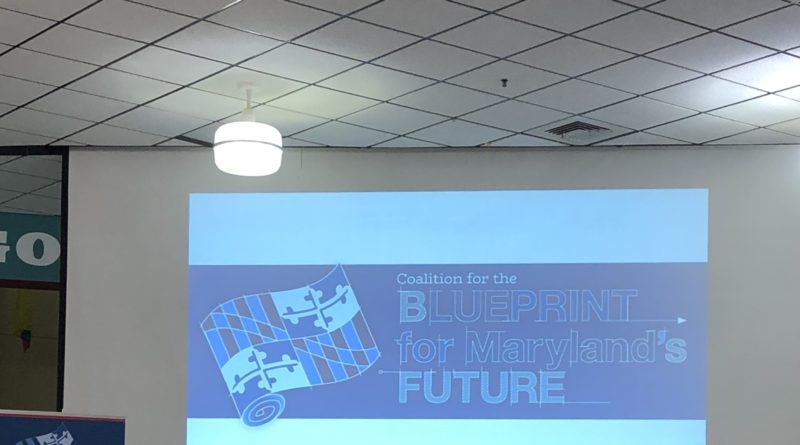Kirwan Commission’s Blueprint for Maryland’s Future Explained, Advocated For at Forum
A forum was held Wednesday, Nov. 6, on the Kirwan Commission for Innovation and Excellence’s Blueprint for Maryland’s Future: a recommendation and funding proposal for programs designed to improve Maryland’s public schools.
The forum, hosted at Montgomery Blair High School by Joe Francaviglia, a former middle school teacher and the current executive director of Strong Schools Maryland, featured speeches by Assistant Superintendent Ruschelle Rueben and the commission’s chair and namesake Dr. William Kirwan. There was also a panel and question-and-answer session with President and CEO of McFarland Associates George McFarland, MCC PTA Vice President of Administration Tracie Potts, MCR SGA President Pranav Tadikonda, and Montgomery County Executive Marc Elrich.
Ms. Rueben opened the forum by providing an overview of the recommendations Kirwan makes including greater mental health supports, more strategies to boost student attendance and achievement, increasing professional development and pay raises for teachers, hiring better-qualified and more diverse teachers, implementing better college and career readiness pathways, expanding early childhood education programs, and more.
“This work is timely,” Ms. Rueben says. “It underpins our belief in MCPS that ‘All Means All.’”
Ms. Rueben, along with Mr. Francaviglia and Dr. Kirwan, urged attendees to advocate for the passage of Maryland Senate Bill 1030, which would bring Kirwan into effect.
Ms. Rueben adds, “We urge you to stay engaged [and] to lift your voices with unified support of the full funding of the commission’s findings for … all schools in Maryland.”
Dr. Kirwan and Mr. Francaviglia then spoke about the impetus behind the commission. Both referenced Maryland’s mediocre performance on national standardized tests.
“[Maryland’s poor performance] would be bad enough if the US were a shining city on the hill,” Dr. Kirwan explains. “But we don’t fare well in international comparisons either. We studied intensely, for two years, the elements of high-performing school systems from around the world to find major policy recommendations.”
Mr. Francaviglia notes that schools are being underfunded by $2.9 billion across the state, and schools with high concentrations of impoverished students often fare much worse than others—especially when it comes to preparing students for life after high school.
“The data couldn’t be clearer that we need additional supports for schools with high concentrations of students in poverty,” Mr. Francaviglia says. “[Current] outcomes can’t continue, and the solution is the Kirwan Commission.”
A major concern surrounding Kirwan is the cost to enact the aforementioned reforms. The commission’s recommendations are estimated to cost $3.8 billion over the next 10 years, with $500 million going to Montgomery County school districts. This is broken down into $262 million from local jurisdictions and $235 million from the state. Should it be passed, it is projected that funding for Kirwan would come from increased income taxes, fewer corporate tax breaks, taxes on marijuana sales, and increased taxation of casinos’ profits among other revenue sources.
All presenters thought that Kirwan’s suggested programs were worth the expenditures.
“I think Kirwan funding is going to make a difference in how we’re able to educate our children,” Mr. Elrich says. “I was a teacher for 17 years … and when you’re teaching, you get an intense sense of how valuable these resources are.”
“People say, ‘Can we afford to do it?’ We can’t afford not to do it.” Dr. Kirwan says. “If we educate students to the level the commission calls for … these recommendations [will] pay for themselves in a period of 10 years.”
Each Maryland school district would be able to decide how it would spend the money from the Kirwan Commission.
The Kirwan Commission will be voted on as Maryland House of Delegates Bill 2 and Maryland Senate Bill 2 towards the end of the 2020 legislative session.



